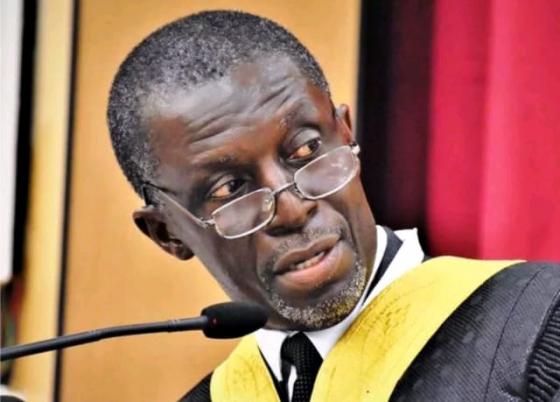‘Chief Justice Korkpor Erred’

Cllr. Tiawan S. Gongloe, Former President, Liberia National Bar Association.
-- Cllr. Gongloe differs with claim by the Chief Justice that judges are being attacked because of media reports
The President of the Liberia National Bar Association has strongly disagreed with Chief Justice Francis Korkpor’s assertion that coverage by journalists assigned to the Supreme Court is responsible for “attacks against judges.”
In his charge, at the opening of the Supreme Court, Chief Justice Korkpor claimed that judges Roland Dahn and Roosevelt Willie were attacked recently due to “misleading and unfounded” coverage from journalists assigned to the Supreme Court.
“The Press Union of Liberia (PUL), the investigation established that the stories against Judge Willie were unfounded, baseless, false, and misleading,” Chief Justice Korkpor said at the opening of the October Term of Court for Supreme Court. “This is just a minute example of the many misinformation and character assignments that members of the Judiciary endure from time to time. Many of such false stories and machinations go without redress.”
The statement by the Chief Justice, which was made in the presence of President George Weah, House Speaker Bhofal Chambers, and Senate Pro-Tempore Albert Chie, claimed that as a result of a false narrative, justices, judges, and magistrates continue to constantly receive threats of harm -- the intent of which is to intimidate, create a chilling effect and undermine the rule of law.
But in response to the Chief Justice’s claim, Cllr. Tiawan Gongloe reminded the Supreme Court and Justice Korkpor that his opinion was wrong -- since
brutal expressions regarding decisions of the Court have, on some occasions come from justices of the Supreme Court -- in dissenting opinions.
The LNBA President -- who is also a constant critic of the court -- asserted that the view held by the public of the existence of judicial corruption is backed by remarks from members of the judiciary, including the Chief Justice himself.
“For example on one occasion, the late Chief Justice Johnnie Lewis once admitted that ‘the judiciary needs to be cleaned up and public confidence restored in the court’s system’ and at the opening of the May Term of Court, the chief Justice openly admitted that Liberian Judges are corrupt without mentioning the name of any individual judge,” Cllr. Gongloe said as a point of correction to Justice Korkpor’s remarks against court reporters.
He further said that while views expressed by lawyers, party-litigants, and observers of the judiciary may be considered not constructive or merely intended to make the judiciary look bad, no reaction of a judicial officer at any level of the judiciary should be for the protection of the image of the judiciary.
“There is no [point in] history that a judge has ever been removed from office in Liberia because of a newspaper report or comment made by any citizen or observer of the court. The important thing is that, in a democracy, there must be an unfettered flow of views on the functioning of the three branches of government,” Cllr. Gongloe added. “Public opinions about a judge are not a precondition for maintaining a judicial office but upholding the oath of his/her office at all times and to remain loyal to his/her conscience and country in the performance of his/her duties as a judge.”
He added that the issue of free expression of views should not be curtailed or discouraged in any manner, shape, or form and that critical views about the judiciary should encounter no disciplinary action, but the same should be taken in good faith by all members of the judiciary as was done in the case of Chief Justice Korkpor and the late Chief Justice Lewis.
“Our Constitution provides for equal treatment before the law. There is more good in criticism than any harm that may be done by it. We cannot build a free society without freedom of expression,” Gongloe noted.
Meanwhile, Cllr. Gongloe has disclosed that some lawyers assigned at the Supreme Court have perennially complained of having to wait for several terms of court after arguing a case before the court can render its opinions.
He claimed that the failure or delay in making decisions in cases that have been argued before the Supreme Court is also a major source of delay in “concluding cases brought before this court on appeal.”
“Such actions on the part of this Court tends to undermine public confidence in the Judiciary,” he alleged. “There is another observation about this Court that is becoming popular among lawyers, their clients, and the greater Liberian society.”
Gongloe noted that such glaring views of the decisions of the Supreme Court, in some cases, tend to create doubts and sometimes confusions as to the implications of the Court’s decision.
“It is important that this Court, as the final arbiter of all disputes in the Republic of Liberia, be crystal clear in all its decisions, in order to aid the Liberian people in sustaining the peace that they continue to build after 14 years of fratricidal civil conflict. In short, the Court must be clear and unambiguous in its decisions,” the LNBA President added.
